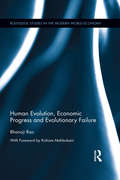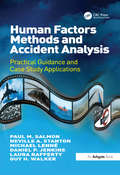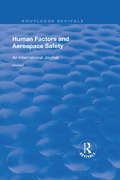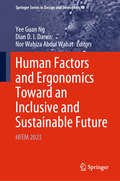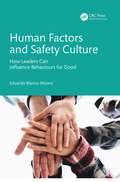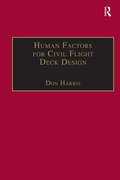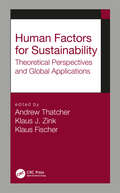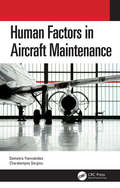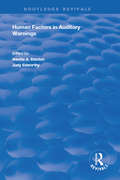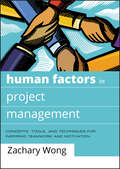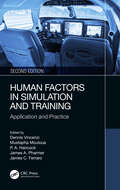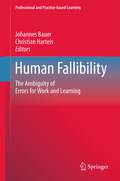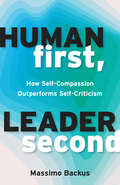- Table View
- List View
Human Evolution, Economic Progress and Evolutionary Failure (Routledge Studies in the Modern World Economy)
by Bhanoji RaoThis monograph is an innovative endeavour in many ways. First, it brings to the fore the synergy between human evolution and economic and social progress. Second, it acknowledges the critical contributions from the routine adherence to contextual truth and contextual non-violence of humanity at large. Finally, it argues that the world is sliding towards evolutionary failure by not moving further forward in the adherence to the two core human values. For all those interested in development in a holistic sense, the book will inspire thinking and debate. Human evolution will go on – one way or the other – with or without adherence to truth and non-violence. The book stresses the time is now, to go for the best and eschew the worst.
Human Experience at Work: Drive Performance with a People-focused approach to Employees
by Ben WhitterThe only way for HR professionals to ensure sustainable top performance from their workforce is by taking a people-focused approach to their employees. To outperform their competitors, businesses need happy, engaged and committed employees performing to their full potential. Investing in new technologies or embracing people analytics won't achieve this but a people-focused approach will. It not only improves staff engagement, productivity and wellbeing but also secures the benefits for the business with Deloitte reporting in 2019 that 'organizations focusing on human experience are twice as likely to outperform their peers in revenue growth over a three-year period.' Human Experience at Work is a practical guide for HR professionals and those responsible for talent management which provides advice, examples and guidance on how to embed people-centred approach to staff development. Human Experience at Work covers what human experience is, the benefits for the organization, the benefits for employees, how to make it part of a talent management and organizational development strategy and how to leverage it. There is also coverage of how focusing on people and allowing them to be themselves at work creates a more diverse and inclusive work environment. Supported by case studies, insights, and examples from companies including GSK, Ford, IKEA, Fotile, Grenade, Huel, and Moneypenny.
Human Factor in Nuclear Security: Establishing and Optimizing Security Culture (Advanced Sciences and Technologies for Security Applications)
by Igor KhripunovThis book attempts to look into the genesis of security culture as a concept which emerged with the recognition of the role of the human factor in the context of security. It traces the rapid evolution of security culture into a multi-functional discipline reinforced by supplementary tools such as assessment and enhancement methodologies, reviews practical steps to harmonize nuclear safety and security culture as well as recommends its practical application to address insider threats and their consequences. In addition, it demonstrates how to tailor the generic model of nuclear security culture to meet specific needs of diverse facilities and activities in different countries. Finally, the book discusses several challenges which need to be addressed to make security culture a user-friendly, universal, and sustainable instrument to turn the perception of the human factor as a liability into an asset of nuclear security.
Human Factors
by Gesine Hofinger Kristina Lauche Petra Badke-SchaubIn Branchen wie Luftfahrt, Kernkraft oder Medizin können menschliche Fehler dramatische Konsequenzen haben. Deshalb werden in Risikobranchen Maßnahmen benötigt, die Fehlerquellen minimieren, sicheres Handeln fördern und dabei den "Faktor Mensch" berücksichtigen. Die Psychologie sicheren Handelns wird im 1. Teil des Standardwerks von Wissenschaftlern erläutert, im 2. Teil stellen erfahrene Praktiker und Wissenschaftler aktuelle Herausforderungen einzelner Branchen vor und präsentieren Lösungsansätze. Mit vielen Fallbeispielen und Praxishinweisen.
Human Factors Methods and Accident Analysis: Practical Guidance and Case Study Applications
by Daniel P. Jenkins Neville A. Stanton Guy H. Walker Paul M. Salmon Michael Lenné Laura RaffertyThis book provides an overview of, and practical guidance on, the range of human factors (HF) methods that can be used for the purposes of accident analysis and investigation in complex sociotechnical systems. Human Factors Methods and Accident Analysis begins with an overview of different accident causation models and an introduction to the concepts of accident analysis and investigation. It then presents a discussion focussing on the importance of, and difficulties associated with, collecting appropriate data for accident analysis purposes. Following this, a range of HF-based accident analysis methods are described, as well as step-by-step guidance on how to apply them. To demonstrate how the different methods are applied, and what the outputs are, the book presents a series of case study applications across a range of safety critical domains. It concludes with a chapter focussing on the data challenges faced when collecting, coding and analysing accident data, along with future directions in the area. Human Factors Methods and Accident Analysis is the first book to offer a practical guide for investigators, practitioners and researchers wishing to apply accident analysis methods. It is also unique in presenting a series of novel applications of accident analysis methods, including HF methods not previously used for these purposes (e.g. EAST, critical path analysis), as well as applications of methods in new domains.
Human Factors and Aerospace Safety: An International Journal: Volume 1 (Routledge Revivals)
by Don Harris Helen C. MuirThis title was first published in 2001. There have been significant advances in the engineering design and production standards of the hardware and electronics in commercial aircraft. It is now uncommon for the principal (or sole) cause of an aircraft accident to be a component failure. Human error is now implicated in up to 80 per cent of all civil and military aviation accidents. The human being is now arguably the least reliable component left in the system. This basic premise forms the basis for this international journal. The journal focuses specifically on the human element in the aerospace system and its role in either causing accidents or incidents, or in promoting safety. The journal solicits contributions from both academic researchers and practitioners from industry. Human factors and safety are applied sciences and this is reflected in the tone and composition of the papers in the journal.
Human Factors and Design
by Yuri SpirochkinThis book describes various manifestations of human factors when interacting with potentially dangerous technical systems: airplanes, launch vehicles and spaceships, nuclear power plants, energy-saturated ground vehicles and infrastructure facilities. The idea of the book arose from the desire to find a common ground between industries that are important for safety. Their similarity lies, in addition to the technological advancement of products and solutions, in equally high safety requirements, in particular taking into account the influence of human factor. Thus, it is of relevance to analyze an impact of human factor in the context of safety. The matter is rather complex: on the one hand humans manage technical systems, on the other hand human errors, negligence or evil intentions can turn the system into a threat with disastrous consequences. However, human interaction with any technical system begins earlier – in the design stage. In this stage, designer, being creator of the system, must ensure a safe operation and take into consideration possible risks, including those caused by human factors itself. The book is interdisciplinary in nature and intended mainly for designers of technical systems, aiming to assist the specialists in understanding the issues of human participation in life cycle of these systems. The examples given are intended to benefit from experiences of not one, but a number of industries.
Human Factors and Ergonomics Toward an Inclusive and Sustainable Future: HFEM 2023 (Springer Series in Design and Innovation #46)
by Yee Guan Ng Dian D. I. Daruis Nor Wahiza Abdul WahatThis book gathers the refereed proceedings of the 5th HFEM Biennial Conference on Human Factors and Ergonomics, organized by the Human Factors and Ergonomics Society Malaysia, held in Langkawi, Malaysia on August 13–18, 2023. Under the theme "Accelerating Human Factors and Ergonomics Toward an Inclusive and Sustainable Future", it highlights the latest theories and models, as well as cutting-edge technologies and applications on human factors and ergonomics. By combining findings from a range of disciplines including engineering, design, robotics, health care, management, computer science, human biology, and behavioral science, it offers an excellent source of innovative ideas to stimulate future discussions and developments aimed at applying knowledge and techniques to optimize system performance, while at the same time promoting the health, safety, and well-being of individuals. It includes papers from researchers and practitioners, scientists and physicians, institutional leaders, managers, and policy makers that contribute to constructing the human factors and ergonomics approach across a variety of methodologies, domains, and productive sectors.
Human Factors and Ergonomics of Prehospital Emergency Care
by Joseph R. Keebler Elizabeth H. Lazzara Paul MisasiThis book provides an introduction to the field of human factors for individuals who are involved in the delivery and/or improvement of prehospital emergency care and describes opportunities to advance the practical application of human factors research in this critical domain. Relevant theories of human performance, including systems engineering principles, teamwork, training, and decision making are reviewed in light of the needs of current day prehospital emergency care. The primary focus is to expand awareness human factors and outlay the potential for novel and more effective solutions to the issues facing prehospital care and its practitioners.
Human Factors and Safety Culture: How Leaders Can Influence Behaviours for Good
by Eduardo Blanco-MunozThis title explores human behaviour in the context of workplace safety and risk management. Focused on understanding how people detect, interpret and respond to danger and how leaders can put safety at the heart of their organizations’ culture, it draws on the latest insights from disciplines such as cognitive science, neuroscience, psychology, and sociology. Integrating traditional and emerging perspectives in the field of Occupational Health and Safety, this book delivers both a vision and the tools to elevate safety as a core organizational value able to motivate and anchor safe behaviours and reinforce safety‑oriented leadership.Written to include practical frameworks and clear examples, it addresses the cognitive processes, including perception, attention, and memory, that influence individuals’ judgement and decision‑making at work as well as spontaneous behaviour. Readers will discover how biases, emotions, and underlying values play a role in shaping attitudes towards safety, providing a fresh perspective on emotional intelligence and behavioural motivation. Through a "Toolbox‑style" section, filled with actionable techniques that can be applied to any workplace, readers gain strategies to implement these insights immediately, helping to embed safety as a shared cultural value.Additional sections, such as "Did you know?" and "Focus on...", present surprising findings and deeper dives into key topics, revealing real‑world applications. The reader will develop a good understanding of the key theories and practices behind safety culture at work that can be made applicable to any industry. Human Factors and Safety Culture: How Leaders Can Influence Behaviours for Good is designed for those in occupational health and safety, including current and aspiring safety leaders, HR and operations managers, and anyone involved in shaping a positive organizational workplace culture.
Human Factors for Civil Flight Deck Design
by Don HarrisHuman error is now the main cause of aircraft accidents. However, in many cases the pilot simply falls into a trap that has been left for him/her by the poor design of the flight deck. This book addresses the human factors issues pertinent to the design of modern flight decks. Comprising of invited chapters from internationally recognised experts in human factors and flight deck design, contributions span the world of industry, government research establishments and academia. The book brings together the practical experience of professionals across the human factors and flight deck design disciplines to provide a single, all-encompassing volume. Divided into two main parts, part one of the book examines: the benefits of human engineering; flight deck design process; head down display design; head-up display design; auditory warning systems; flight control systems, control inceptors and aircraft handling qualities; flight deck automation; and human-computer interaction on the flight deck and anthropometrics for flight deck design. Part two is concerned with flight deck evaluation - the human factors evaluation of flight decks; human factors in flight test and the regulatory viewpoint Of interest to all human factors professionals operating in high technology, high-risk dynamic industries as well as those engaged directly in aerospace activities, the book will also be of key importance to engineers with an interest in human factors for flight deck design, academics and third year and post-graduate human factors/ergonomics and psychology students.
Human Factors for Sustainability: Theoretical Perspectives and Global Applications
by Klaus J. Zink Andrew Thatcher Klaus FischerThis book deals with the central question of how human factors and ergonomics (HFE) might contribute to solutions for the more sustainable development of our world. The contents of the book are highly compatible with the recent political agenda for sustainable development as well as with sustainability research from other disciplines. <P><P>The book aims to summarize and profile the various empirical and theoretical work arising from the field of “Human Factors and Sustainable Development” in the last decade. The book gives a systematic overview of relevant theoretical concepts, their underlying philosophies, as well as global application fields and case studies.
Human Factors in Aircraft Maintenance
by Demetris Yiannakides Charalampos SergiouThis book provides an in-depth analysis of human failure and its various forms and root causes. The analysis is developed through real aviation accidents and incidents and the deriving lessons learned. Features: Employs accumulated experience, and the scientific and research point of view, and recorded aviation accidents and incidents from the daily working environment Provides lessons learned and integrates the existing regulations into the human factors discipline Highlights the responsibility concerns and raises the accountability issues deriving from the engineers’ profession by concisely distinguishing human failure types Suggests a new approach in human factors training in order to meet current and future challenges imposed on aviation maintenance Offers a holistic approach in human factors aircraft maintenance Human Factors in Aircraft Maintenance is comprehensive, easy to read, and can be used as both a training and a reference guide for operators, regulators, auditors, researchers, academics, and aviation enthusiasts. It presents the opportunity for aircraft engineers, aviation safety officers, and psychologists to rethink their current training programs and examine the pros and cons of employing this new approach.
Human Factors in Auditory Warnings (Routledge Revivals)
by Neville A. Stanton Judy EdworthyFirst published in 1999, this book provides answers to many of the problems associated with the design and application of auditory warnings. It represents the position of contemporary auditory warnings research and development in a single unique volume. Application domains include air traffic control, aviation, emergency services, manufacturing, medicine, military and nuclear power. The contributors constitute many key experts in this area, some of whom are psychoacousticians, some psychologists and some ergonomists. Correspondingly, the chapters range from those covering basic topics such as audibility and localization of warnings, through psychological issues concerned with the relationship between design, understanding and the behavioural response, to the more general ergonomic issues of implementing the warnings in a particular context. Although each of the chapters takes a slightly different perspective, they all balance theoretical underpinning with practical application. The editors have undertaken to draw all of the contributions together by providing an overview of warnings research at the beginning of the book and summary of the contributions at the end. This book will appeal to all involved in the research, development, design and implementation of auditory warnings.
Human Factors in Automotive Engineering and Technology (Human Factors in Road and Rail Transport)
by Neville A. Stanton Guy H. WalkerOffering a unique perspective on vehicle design and on new developments in vehicle technology, this book seeks to bridge the gap between engineers, who design and build cars, and human factors, as a body of knowledge with considerable value in this domain. The work that forms the basis of the book represents more than 40 years of experience by the authors. Human Factors in Automotive Engineering and Technology imparts the authors' scientific background in human factors by way of actionable design guidance, combined with a set of case studies highly relevant to current technological challenges in vehicle design. The book presents a novel and accessible insight into a body of knowledge that will enable students, professionals and engineers to add significant value to their work.
Human Factors in Challenging Environments: From Thermal Comfort to G-Force Exposure (Body of Knowledge in Human Factors and Ergonomics)
by Waldemar Karwowski Beata MrugalskaIn human factors and ergonomics, professionals play a key role in shaping the compatibility between tasks, products, and environments with the needs of individuals. The most successful projects demonstrate a tight integration with the human experience, underscoring the importance of ergonomic design in promoting societal well-being. A human-centered approach to design and evaluation should be championed. This book addresses this issue with an approach that focuses on environmental conditions and ergonomics in physical settings.This book examines human factors and ergonomics across various industrial settings. From tackling challenges posed by thermal to extreme environments, the book offers an understanding of environmental ergonomics, resulting in better, more comfortable, and safer workspaces. It investigates critical topics such as G environments and +Gz Acceleration, equipping the reader with the knowledge to navigate and optimize various workplace conditions. Additionally, the reader will develop a good understanding of environmental ergonomics and understand how an appreciation of it can lead to practical and noticeable changes in their workplace.Human Factors in Challenging Environments: From Thermal Comfort to G-Force Exposure will be of interest to human factors and ergonomics professionals seeking to deepen their expertise and broaden their understanding of the field. It will also appeal to engineers, designers, and policymakers who are invested in creating safer and more efficient work systems.
Human Factors in Project Management: Concepts, Tools, and Techniques for Inspiring Teamwork and Motivation
by Zachary WongIn Human Factors in Project Management, author Zachary Wonga noted trainer and acclaimed leader of more than 250 project teamsprovides a summary of "people-based" managementskills and techniques that can be applied when working in a team environment. This comprehensive resource brings together in one book new and current models in team motivation and integrates the most significant concepts in team motivation and behaviors into a single set of principles called "Human Factors." Wong shows how these factors can be applied to the most challenging issues facing project managers today including Motivating a diverse workforce Facilitating team decisions Resolving interpersonal conflicts Managing difficult people Strengthening team accountability Communications Leadership
Human Factors in Simulation and Training: Application and Practice
by Dennis Vincenzi, Mustapha Mouloua, P. A. Hancock, James A. Pharmer, and James C. FerraroHuman Factors in Simulation and Training: Application and Practice covers the latest applications and practical implementations of advanced technologies in the field of simulation and training. The text focuses on descriptions and discussions of current applications and the use of the latest technological advances in simulation and training. It covers topics including space adaptation syndrome and perceptual training, simulation for battle-ready command and control, healthcare simulation and training, human factors aspects of cybersecurity training and testing, design and development of algorithms for gesture-based control of semi-autonomous vehicles, and advances in the after-action review process for defence training. The text is an ideal read for professionals and graduate students in the fields of ergonomics, human factors, computer engineering, aerospace engineering, occupational health, and safety.
Human Factors in Simulation and Training: Theory and Methods
by Dennis Vincenzi, Mustapha Mouloua, P. A. Hancock, James A. Pharmer, and James C. FerraroHuman Factors in Simulation and Training: Theory and Methods covers theoretical concepts on human factors principles as they apply to the fields of simulation and training in the real world. This book discusses traditional and nontraditional aspects of simulation and training. Topics covered include simulation fidelity, transfer of training, limits of simulation and training, virtual reality in the training environment, simulation-based situation awareness training, automated performance measures, performance assessment in simulation, adaptive simulation-based training, and scoring simulations with artificial intelligence This book will be a valuable resource for professionals and graduate students in the fields of ergonomics, human factors, computer engineering, aerospace engineering and occupational health and safety.
Human Factors in Tourism: A Layperson's Approach (Design Science and Innovation)
by Prabir MukhopadhyayThe textbook covers the application of human factors in different facets of tourism and hospitality industry. It talks about appropriate ambience creation for guests, so they can enjoy their stay. This book enumerates different human factors aspects of dealing with tourists, conducting guided tours, or ensuring that tourists are completely satisfied from the tour in detail but in a layperson’s language. This book discusses details of the application of human factors in the tourism sector. This book aims to fill the gap between the literature available on tourism that deals with people and human factors that deals with the interaction among people, space, and products. This book aids the students and instructors in understanding and teaching different human factors issues in this sector. Further, this book will help professionals in the industry in providing quality services to their clients.
Human Factors in der Industrie: Ein Praxisratgeber: Wie Sie mit Impulsen aus der Luftfahrt Fehler und Nacharbeit vermeiden können
by Martin Hinsch Jens OlthoffDer Alltag in Industriebetrieben ist seit Jahren geprägt von stetig zunehmender Komplexität, Informations- und Dokumentationsflut, Zwang zu intensiver Teamarbeit und ständigem Wandel der Rahmenbedingungen. Da die Luftfahrt über jahrzehntelange Erfahrung in einem solchen Umfeld verfügt, erläutert dieses Buch in leicht verständlicher Sprache praxiserprobte Konzepte und Arbeitsmethoden dieser Branche, die sich gut in die betriebliche Praxis von Industrieunternehmen übertragen lassen. Der Fokus richtet sich auf Maßnahmen im Bereich der Teaminteraktion, Kommunikation, Prozessorientierung, auf Fehlervermeidungskonzepte und die Schwächen der menschlichen Leistungsfähigkeit.Der Inhalt Luftfahrt als Impulsgeber für die Industrie.- Menschliche Grenzen kennen und beherrschen.- Das Dirty Dozen – die 12 häufigsten menschlichen Fehler.- Kommunikation und Teamwork.- Führung. - Situationsbewusstsein und Workload-Management.- Prozesse als Basis replizierbarer Spitzenleistung.- Qualifikation und Training.- Fehlerreflexion und Fehlerbewusstsein.
Human Fallibility: The Ambiguity of Errors for Work and Learning
by Christian Harteis Johannes BauerA curious ambiguity surrounds errors in professional working contexts: they must be avoided in case they lead to adverse (and potentially disastrous) results, yet they also hold the key to improving our knowledge and procedures. In a further irony, it seems that a prerequisite for circumventing errors is our remaining open to their potential occurrence and learning from them when they do happen. This volume, the first to integrate interdisciplinary perspectives on learning from errors at work, presents theoretical concepts and empirical evidence in an attempt to establish under what conditions professionals deal with errors at work productively--in other words, learn the lessons they contain. By drawing upon and combining cognitive and action-oriented approaches to human error with theories of adult, professional, and workplace learning this book provides valuable insights which can be applied by workers and professionals. It includes systematic theoretical frameworks for explaining learning from errors in daily working life, methodologies and research instruments that facilitate the measurement of that learning, and empirical studies that investigate relevant determinants of learning from errors in different professions. Written by an international group of distinguished researchers from various disciplines, the chapters paint a comprehensive picture of the current state of the art in research on human fallibility and (learning from) errors at work.
Human First, Leader Second: How Self-Compassion Outperforms Self-Criticism
by Massimo BackusA self-compassion blueprint for leaders who are closed-off, constantly on the verge of burnout, and/or trapped in the myth of perfectionism.Through this 6-step framework, leaders will learn that self-compassion is for the strong, to separate their title from their person, and how to care for themselves in order to care for others.So many leadership and compassion books seek to remind leaders to behave human and treat those around them with care. But the truth is that leaders are human. They're not playing at being human or calling forth their humanity on demand. Their struggle in marrying leadership and compassion stems from leaders ignoring self-care—the lack of compassion toward their subordinates is just a symptom.Human First, Leader Second introduces leaders to the practice of self-compassion through a 6-step framework designed to ease even the most hard-headed and hard-assed leaders into thoughtful, and productive, introspection. Backward: Biography, Biology, Backstory Forward: Purpose, Values, PrioritiesInward: Intentions, Feelings, ThoughtsOutward: Intent, Actions, BehaviorsLeeward: Self-care and Personal Accountability Wayward: Regret and Self-forgivenessOffering strategies for a personalized exploration of self-compassion—and what works best for the individual—this book will help leaders grow awareness to the importance of self-care while debunking the myth that compassion equals weakness. Regardless of our title or influence, we are all humans first, who need compassion.
Human Flourishing: A Multidisciplinary Perspective on Neuroscience, Health, Organizations and Arts
by Marc Grau Grau Yasin Rofcanin Mireia Las HerasThis open access book presents a novel multidisciplinary perspective on the importance of human flourishing. The study of the good life or Eudaimonia has been a central concern at least since Aristotelian times. This responds to the common experience that we all seek happiness. Today, we are immersed in a new paradoxical boom, where the pursuit of happiness seems to permeate everything (books, media, organizations, talks), but at the same time, it is nowhere, or at least very difficult to achieve. In fact, it is not easy to even find a consensus regarding the meaning of the word happiness. Seligman (2011), one of the fathers of the positive psychology, confirmed that his original view the meaning he referred to was close to that of Aristotle. But, he recently confessed that he now detests the word happiness, since it is overused and has become almost meaningless. The aim of this open access book is to shed new light on human flourishing through the lenses of neurosciences and health, organizations, and arts. The novelty of this book is to offer a multi-disciplinary perspective on the importance of human flourishing in our lives. The book will examine further how different initiatives, policies and practices create opportunities for generating human flourishing.
Human Foibles: How to Counter Tendencies That Can Ambush Your Decision
by Richard LueckeHuman behavior plays an important role in any decision-making process. Some behaviors can hinder people's ability to make effective decisions. This chapter describes a number of the decision traps that threaten good decision making and raises awareness of the foibles that lead us to making bad decisions.
